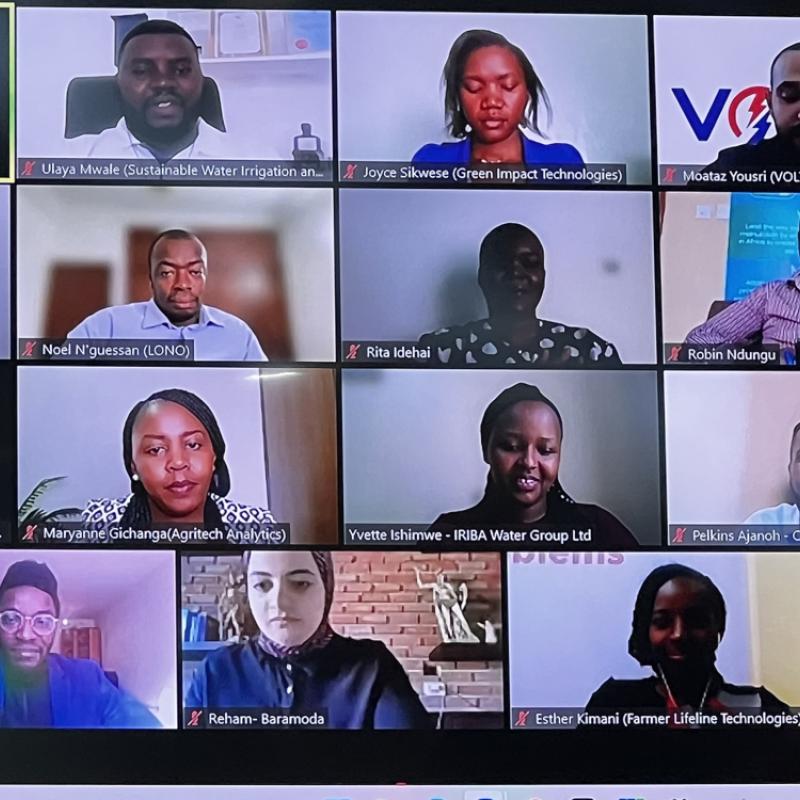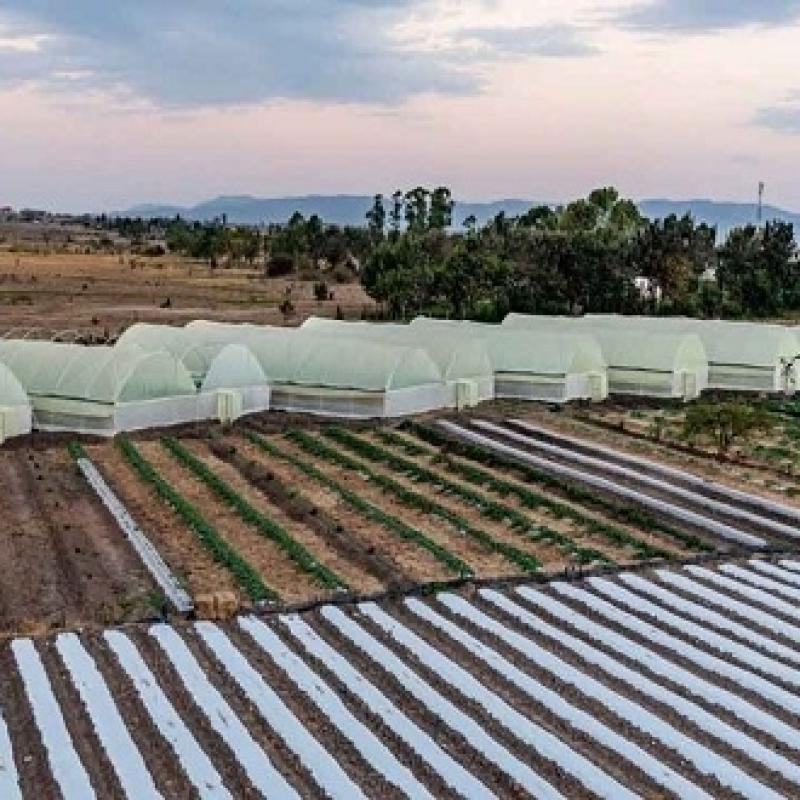
AAAP in the Media
Displaying 1 - 11 of 11
Africa Adaptation Acceleration Program showcases African youths driving climate innovation
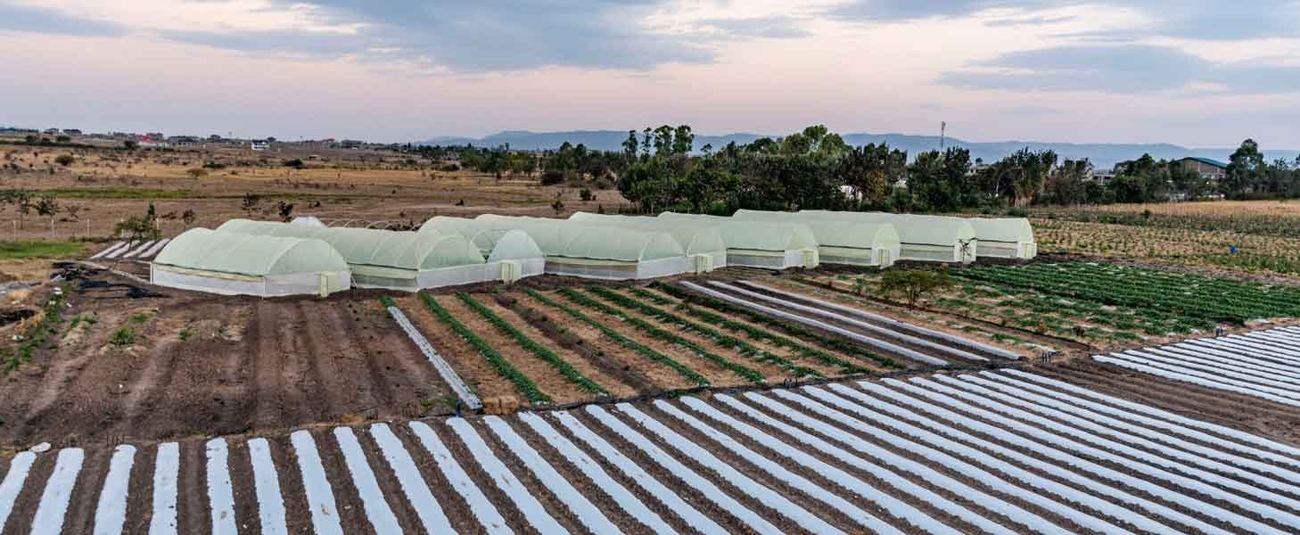
The Africa Adaptation Acceleration program (AAAP) – a joint initiative of the African Development Bank and the Global Center on Adaptation – recently showcased its initiative to harness the dynamism and leadership of Africa’s youth to drive climate adaption innovation.
On the side-lines of the recent 3rd Gobeshona Global Conference(link is external), AAAP brought together participants in its YouthADAPT program to share their experiences with the program as well as strategies to scale up youth-led approaches to adaptation
In his opening remarks, Dr. Kevin Kariuki, African Development Bank Vice President for Power, Energy, and Climate & Green Growth underscored young people’s integral role in Africa’s sustainable development.
“Youth form the backbone of Africa’s population, constituting over 60% of the population. The continent’s sustainable development hinges on harnessing this demographic dividend,” Kariuki said. “The AAAP, through its YouthADAPT pillar, has so far supported 35 youth-led enterprises in 14 African countries with $3.5 million to drive climate actions in sectors such as agriculture, waste management, renewable energy, water and sanitation,” Kariuki added. YouthADAPT is one of AAAPs four pillars for accelerating climate adaptation.
Caroline Mukuhi Mwangi, founder of Kimplanter Seedling(link is external) and Nurseries Limited, said her company was already seeing the benefits of participation in the program. Kimplanter provides drought resistant seedlings that boost food production and food security in Kenya.
Mwangi said, “We have ventured into new markets in semi-arid regions and expanded our seedling varieties, increasing our revenue by 36% as a result of AAAP support. Our customer base has also grown from 8,000 to 16,000 farmers and we have increased our staff from 17 to 32, all of whom are women or youth.”
Aramide Abe, the Program Lead of Jobs for Youth & Entrepreneurship at the Global Center on Adaptation(link is external) confirmed that participating enterprises have already begun to show results. She said some have seen revenues rise by up to 50 percent. A fifth have ventured into new markets and have raised over $106,000 in additional funding from different sources.
Juveline Ngum, the founder of Bleaglee Waste Management Limited, a Cameroon-based start-up company using drone technology to tackle waste disposal, also stressed the benefits of participating in YouthADAPT.
“We have expanded our waste disposal management solution from west Cameroon into Douala, effectively using drones to detect clogged drainages and utilizing data for demand driven waste management,” Ngum said. Now, we aim to expand across national borders into Dakar, Senegal.”
Noël N'guessan’s Cote d’Ivoire-based company, LONO(link is external) – a winner of the 2022 YouthADAPT challenge – has patented technology for the production of organic fertilizer. The company has also introduced modular and mobile bio digesters for the agri-food sector. Biodigesters use microbes and other bacteria to break down organic waste including fat, greases, and even animal manure.
Still, Nguessan said challenges remained. “The cost of prototyping hardware equipment can be prohibitively high, resulting in lengthy project development cycles, “he said. He pointed to financial management training as vital for youth-led businesses.
The session also featured presentations by African Development Bank partners and other global organizations that have rolled out similar initiatives to YouthAdapt.
Sandra Simbiri, Program Specialist at UNICEF’s Generation Unlimited(link is external), said:
“Supporting entrepreneurs through STEM principles is key to preparing the young for technological innovations.”
Alfred Asiko, Senior Market Engagement Manager for the ClimateTech Programme at GSMA(link is external), a mobile technology association, said it has played a role in empowering youth to deploy such technologies as the Internet of Things, artificial intelligence and blockchain to tackle climate challenges.
“Through our innovation fund, we offer grants to climate startups, with a focus on supporting resilient solutions that utilize frontier technologies. We also provide skills development and training to help entrepreneurs succeed in scaling their innovations,” Asiko said.
He said that venture capital (VCs) firms had a critical role to play. ”We need to see more VCs stepping up and taking over from development finance institutions (DFIs) in providing financing and support to youth-led businesses,” he added.
YouthADAPT targets reaching 10, 000 African youth-led enterprises by 2025, promoting innovation and inclusive growth for young people in climate resilient jobs and through youth enterprise development. The AAAP’s other three pillars are Climate-Smart Digital Technologies for Agriculture and Food Security; the African Infrastructure Resilience Accelerator and the Innovative Financial Initiatives for Africa
The third annual Gobeshona Global Conference, organized by the International Centre for Climate Change and Development, took place virtually from 10-16 March 2023. It focused on monitoring Locally- Led Adaptation (LLA) and resilience.
20 young African entrepreneurs bag $100,000 each to boost their climate adaptation businesses
Programme Showcases African youths driving climate novelty
African Development Bank-supported Cameroonian start-up provides low-cost greenhouses, sustainable solutions to boost livelihoods
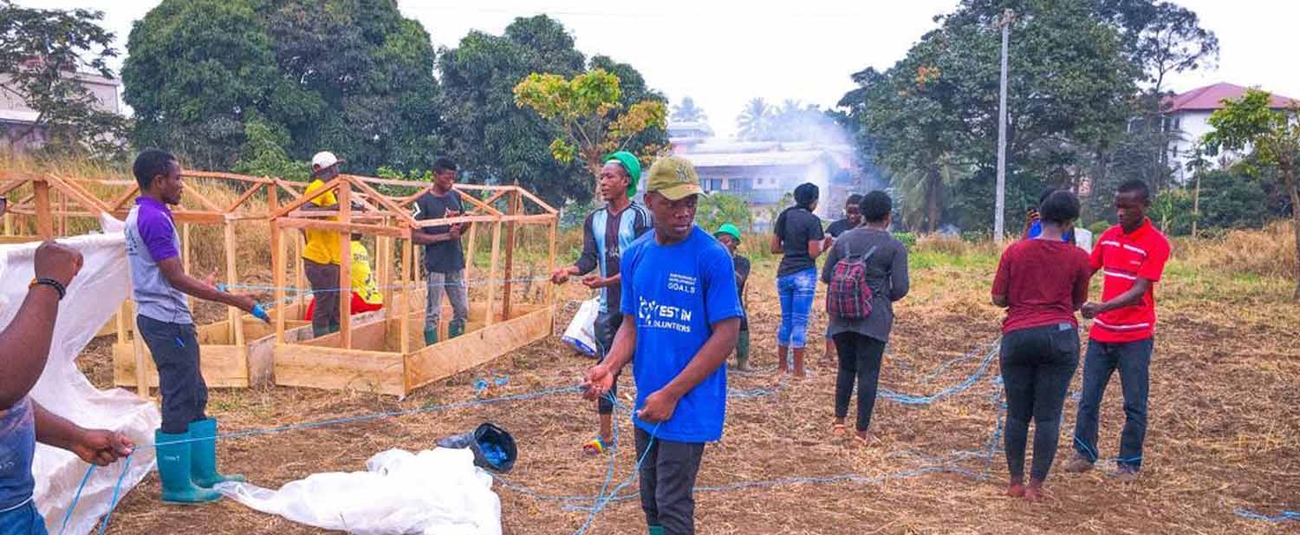
A youth-led agricultural start-up is supporting farmers in climate-vulnerable Cameroon to produce crops sustainably year-round using low-cost greenhouses and solar-powered irrigation.
Mumita Holdings is a beneficiary of the African Development Bank’s investment into the channelling of private capital to young African entrepreneurs, who are seen as critical to unlocking innovative solutions to climate change and the continent’s energy transition.
Tackling climate change is an urgent global priority and perhaps more critical in Africa. The continent is home to nine of the ten countries most vulnerable to climate change worldwide. In response to this pressing challenge, the African Development Bank Group has committed to mobilize $25 billion in climate finance by 2025.
Mumita’s CEO, Matiedje Nkenmayi Gislaine, was among 15 winners of the 2021 African Youth Adaptation (YouthADAPT) Solutions Challenge, organized annually by the bank and the Global Centre on Adaptation as part of their joint Africa Adaptation Acceleration Program (AAAP). Mumita received a development grant of $100,000 and participated in a 12-month business accelerator program to scale up the business, create more jobs and expand its impact.
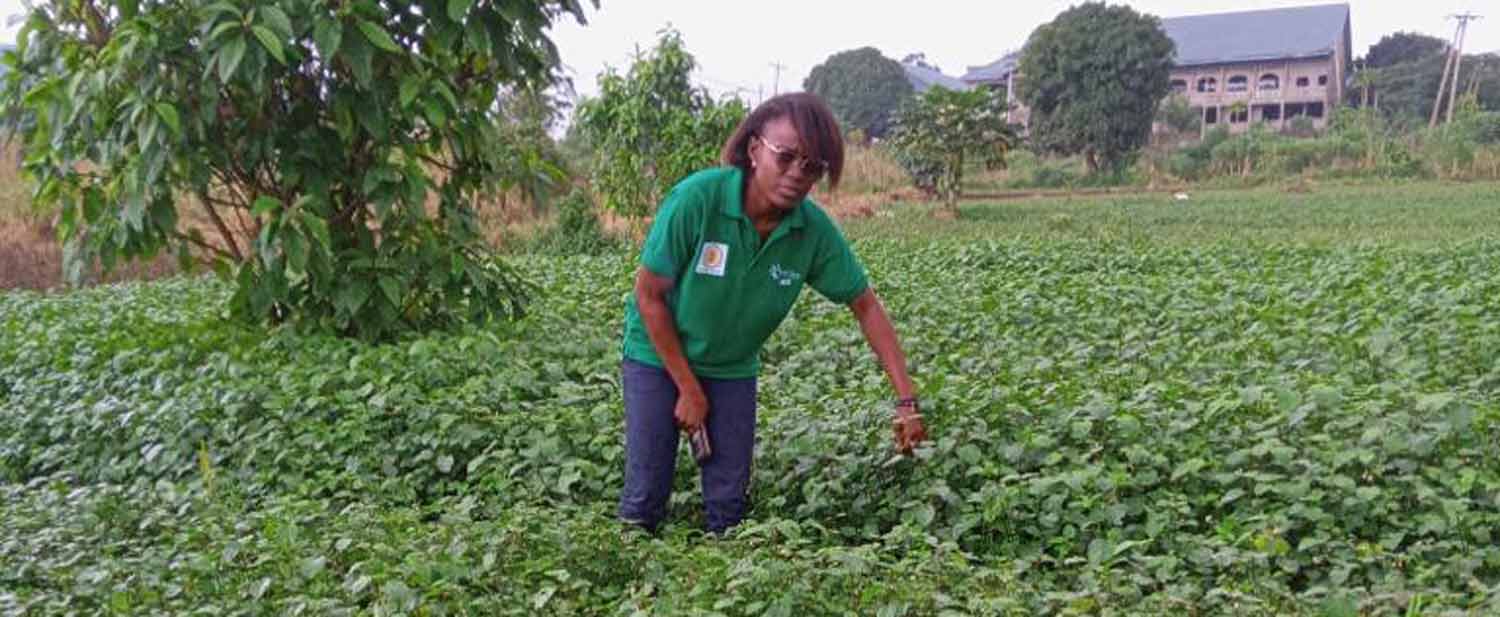
Mumita supports farmers in climate-vulnerable Cameroon to produce crops sustainably year-round using low-cost greenhouses and solar-powered irrigation. The firm mainly targets rural women farmers that cultivate African indigenous green leafy vegetables such as ndole and eru, or bitter leaf and wild spinach. These vegetables are an important source of revenue and nutrition. Demand for these leafy greens and tubers has increased, but production has not kept pace. At the same time, climate change impacts, including erratic rainfall patterns, have also hurt yields.
Mumita provides low-cost greenhouses that facilitate the year-round cultivation of vegetables. The greenhouses are made from materials such as wood, cement and mesh that are sourced locally from farmers. This has reduced the cost of building a greenhouse from $2,500 to about $500. The cost reduction has boosted yields and earnings. Mumita has also partnered with French company ASAP PROS1 to brand vegetable packaging with its own label.
For Nkenmayi, winning the YouthADAPT Challenge translated into multiple benefits for her business and rural communities in Cameroon.
“YouthADAPT funding has enabled us to construct two steel greenhouses in two cooperatives, as well as 10 wooden greenhouses, which has helped improve the capacity of vegetable nurseries from 1,500 seedlings to 25,000 seedlings,” Nkemanyi said. “We have also set up a processing unit, which can transform 1 tonne of dried vegetables per week, up from an initial 100 kg. We have also trained over 2,300 farmers in 10 villages in the southwest region, Mbanga in the Littoral region, Bamenda in the Northwest, and Boumnybel,” she added.
Currently, Mumita can supply indigenous dried vegetables in most of Cameroon but aims to expand coverage within and into other parts of sub-Saharan Africa.
The African Development Bank recognises the critical role of private investment, in closing financing gaps to drive green growth and build climate resilience. In line with this commitment, the bank is focusing on Mobilizing Private Sector Financing for Climate and Green Growth in Africa as the central theme of its 2023 Annual Meetings scheduled for 22-26 May in Sharm El Sheikh, Egypt
AAAP webinar: Innovation essential for climate-smart future, but it's not enough
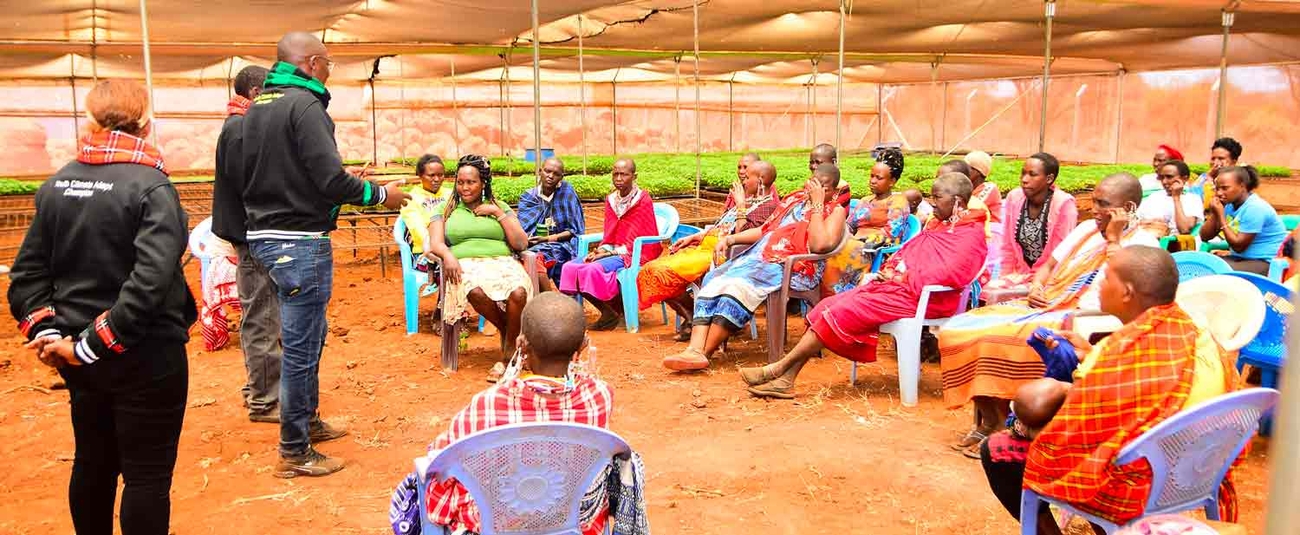
The 2022 United Nations Climate Change Conference, COP27, is dubbed ‘African COP’ as the impact of climate change on African countries will be a key theme of discussions. Agriculture and food systems will also be a critical focus of COP27, with Saturday, 12 November, dedicated to both themes, in addition to adaptation. Also high on the climate agenda is the role of the youth, as 10 November is dedicated to their participation.
Ahead of COP27 and in line with their commitment to this youth agenda, the African Development Bank and the Global Center on Adaptation hosted a webinar to examine ways to make agriculture attractive to the youth.
The webinar titled, Are Climate-Smart and Digital Agriculture Solutions the Silver Bullet to Attract Youth, highlighted the potential of climate-smart and digital agriculture in attracting young people and thereby rejuvenating an aging global agricultural sector.
Dr. Kevin Kariuki, African Development Bank’s Vice President for Power Energy, Climate and Green Growth, pointed out the challenges the agriculture sector faces due to the changing climate change.
“Agriculture across most of sub-Saharan Africa is still predominantly rain-fed and therefore extremely vulnerable to both short-term fluctuations and long-term changes in climate conditions. It is the most exposed sector with estimates indicating that climate change will cause a decrease in yields of 8 – 22% for Africa’s rain-fed staple crops over the next 20 years,” Kariuki said.
Dr. Beth Dunford, African Development Bank’s Vice President for Agriculture, Human and Social Development, noted that while agriculture holds tremendous potential for job creation in Africa, its current traditional form is not attractive to young people for various reasons, including negative perceptions.
“Who wants to wear overalls, dig the field with a hoe or drive a tractor when we can do it in a suit and dust coat, right? However, technology makes agriculture cool enough to motivate them to use tech-enabled enterprises to be part of agricultural value chains,” Dunford said.
Prof. Anthony Nyong, Senior Director for Africa at the Global Centre on Adaptation, said: “There is a gap in the agriculture sector in Africa, and that is in the use of digital solutions.”
AAAP’s Climate Smart Digital Technologies for Agriculture and Food Security Pillar is scaling up access to digital technologies and associated data-driven agricultural and financial services for at least 30 million African farmers.
In the African Development Bank’s Program to Build Resilience for Food and Nutrition Security in the Horn of Africa (BREFONS), currently ongoing in Djibouti, Ethiopia, Kenya, Somalia, South Sudan, and Sudan, the AAAP is facilitating the integration of climate-smart digital technologies for adaptation and resilience.
“The project will increase the productivity of crops and livestock by 30%, reaching about 1.3 million farmers and pastoralists using climate services such as index insurance. About 55,000 additional jobs will be created for youth and women,” said Oluyede Ajayi, Africa Program Lead, Food Security and Rural Well Being, Global Centre on Adaptation.
Panelists said the youth must utilize their digital skills to accelerate the transformation of the agricultural sector, which forms the central pillar of Africa’s economy. They urged participants to contribute to solutions that enhance market linkages to promote agribusiness.
“Africa’s significant youth population faces rising unemployment with myriad negative consequences. These challenges are further exacerbated by climate shocks, skill gaps & limited preparedness to address the effects of climate change,” said Andre-Marie Taptue, Principal Economist at the African Development Bank's Jobs for Youth program.
AAAP’s YouthAdapt program promotes sustainable job creation through entrepreneurship in climate adaptation and resilience in Africa by unlocking $3 billion in credit for adaptation action.
Last year, the first set of ten young African entrepreneurs and Micro, Small, and Medium-sized Enterprises offering innovative solutions and business ideas that can drive climate change adaptation and resilience were awarded at COP26 in Glasgow. This year the Africa Youth Adaptation Competition 20 enterprises across Africa will each receive up to $100,000 in addition to mentorship and coaching to support their climate change adaptation innovation.
Panelists included Claude Migisha from the African Development Bank, Dr. Fleur Wouterse, and Aramide Abe from the Global Center of Adaptation. They shared their views on how AAAP was shaping and adding value to the Bank Digital Agriculture Flagship program, ways to accelerate investor engagement in agriculture adaptation, and how the YouthADAPT was moving the needle on entrepreneurship, unlocking finance and job creation.
Gislaine Matiedje Nkenmayi from Mumita Holdings, a recipient of the 2021 YouthADAPT Challenge award, shared her experience on how the $100,000 grant transformed her enterprise.
“With the grant, we were able to reach out to more than 10 cooperatives with a total of 257 smallholder farmers, to whom we offer free advisory services, low-cost greenhouses and solar-powered irrigation systems. We have been able to expand production from 100kg to 1000kg of fresh vegetables weekly,” Nkenmayi said.
In her concluding remarks, Edith Ofwona Adera, Principal Regional Climate Change Officer and AAAP coordinator at the Bank stressed the need to strengthen adaptation and resilience measures and expedite mainstreaming climate adaptation for transformation at scale. She called for the engagement of the private sector, given the role they can play in adapting to climate change, financing adaptation, and supporting others through products and services for resilience.
Winners of the 2021 YouthADAPT Challenge acquire skills to accelerate climate adaptation innovation and create green jobs

Winners of the Africa Adaptation Acceleration Program’s 2021 YouthADAPT Challenge have received training to equip them to produce and scale climate-related innovation and create green jobs.
The challenge competition awards business grants of up to $100,000 to young entrepreneurs and micro, small, and medium-sized enterprises in Africa to develop innovative solutions on climate adaptation and resilience.
During the three-day workshop, the 2021 winners – 10 representatives of enterprises from Ghana, Nigeria, Cameroon, Kenya and Zambia – received training in financial management and fundraising. Winning enterprises also received training on budgeting and cash flow projection, record keeping, and executing solid business plans.
The 10 entities are developing solutions in critical social and economic sectors affected by climate change, including agriculture; waste management; water resources and sanitation; renewable energy and energy efficiency; waste management and ecosystem restoration. Half of the enterprises are women-led businesses.
The training also instructed participants in how to position their enterprises in the market in order to offer an attractive funding proposition.
Ifeoluwa Olatayo of Soupah Farms-en-market in Nigeria, said she learned a lot during the training, including “how best to review the company’s finances and budget against unexpected shortfalls.”
Another participant, Juveline Ngum Ngwa of Mumita Holdings Limited in Cameroon, acknowledged the importance of budgeting in her enterprise’s overall success and security. “It allows us to better understand whether our business has enough revenue to pay its expenses,” Ngum Ngwa said.
Carolyne Mukuhi of Kimplanter Seedlings in Kenya said: “We look forward to this great journey towards a successful, impactful climate-adaptable business. A great world together.”
In addition to the training, the winning enterprises will be provided with mentorship and support to expand partnerships, knowledge sharing and learning through a network of young entrepreneurs in climate adaptation. The challenge also offers its winners an opportunity to participate in a 12-month business accelerator program to help them scale up their businesses, deepen their impact and create decent jobs.
An annual competition, the challenge falls under one of the pillars of the Africa Adaptation Acceleration Program, namely empowering youth for entrepreneurship and job creation in climate adaptation and resilience. The strategic goal is to strengthen inclusive growth and broaden investment and economic opportunities for youth in Africa by providing training, mentorship, and financing to youth-led businesses.
The Africa Adaptation Acceleration Program is a partnership between the African Development Bank and the Global Center on Adaptation.
The African Development Bank’s contribution to the YouthAdapt Challenge was sourced from the Youth Entrepreneurship and Innovation Multi-donor Trust Fund.
Global Center on Adaptation, AfDB host regional forum on the future of resilient food systems in Africa
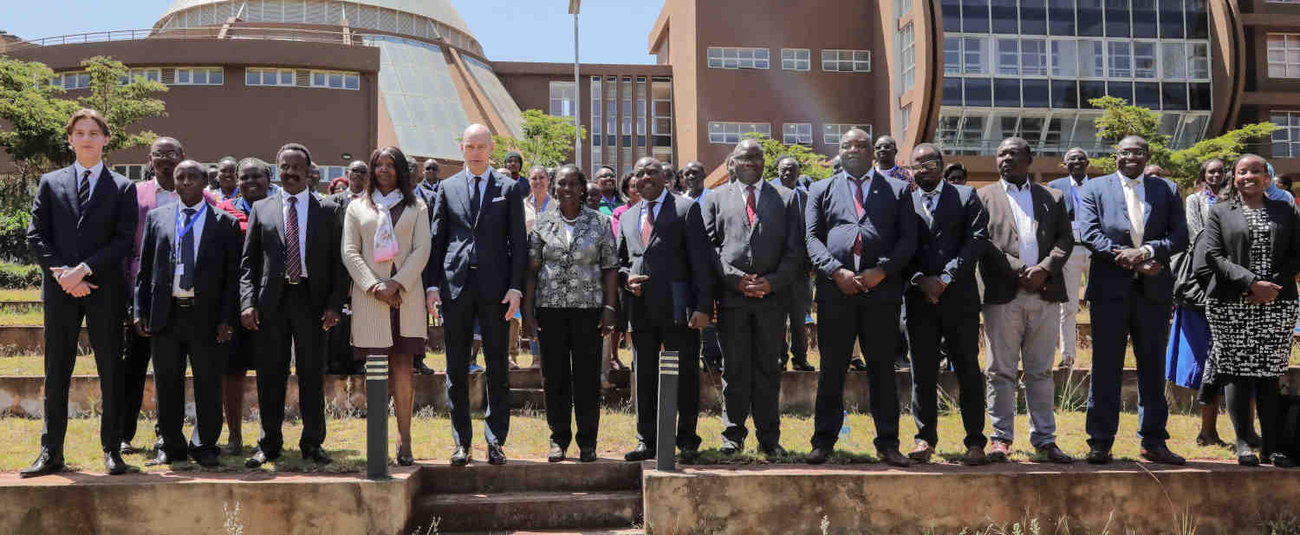
The Global Center on Adaptation (GCA) in collaboration with the African Development Bank and the Wangari Mathai Institute have concluded a three-day regional forum on the future of resilient food systems in Africa.
The Forum, called the Future of Resilient Food Systems in Africa – AAAP Digital Solutions for a Changing Climate provided training aimed at strengthening the capacity of stakeholders from across Eastern Africa to design and implement solutions to improve food security and climate resilience and to facilitate knowledge sharing among farmers on approaches to scale up the use of Digital climate-informed advisory services, or DCAS.
Digital climate-informed advisory services are tools and platforms that integrate climate information into agricultural decision-making. These services range from digital mobile apps, radio, and online platforms to digitally enabled printed bulletins based on climate models and extension services that utilize climate information platforms.
DCAS offers crucial opportunities to build the resilience of small-scale producers in the face of worsening climate change impacts. From seasonal forecasts to pest advisories, effectively designed services provide producers with the resources to adapt to climate shocks and plan for new climate conditions.
Globally, more than 300 million small-scale agricultural producers have limited or no access to such services because service provision is still fragmented, unsustainable beyond project cycles, and not reaching the last mile.
Speaking at the opening ceremony of the forum, Professor Patrick Verkooijen, CEO of Global Center on Adaptation called for urgent financial support to put Africa on the path of food sovereignty.
“Africa needs urgent support to scale up the implementation of adaptation solutions that are already yielding good results for irrigation, developing drought-resistant seeds, crops and livestock diversification, “ he said.
“Through the African Adaptation Acceleration Programme, AAAP, we are rolling out a $350 million project to build resilience for food and nutrition security in the Horn of Africa towards mobilising new digital climate technology for market information, insurance products, financial services that can and must be tailored to smallholder farmers’ needs”, he added.
Speaking on behalf of the African Development Bank’s East Africa Regional Director General, Nnenna Nwabufo, Dr Pascal Sanginga, Regional Sector Manager for Agriculture and Agro-Industries noted that the forum was timely, coming hot on the heels of the recently concluded Dakar 2 Feed Africa-Food Sovereignty and Resilience summit , organised by the African Development Bank.
“The Africa Adaptation Acceleration Program (AAAP) is already contributing to closing Africa’s adaptation gap by supporting African countries to make a transformational shift in their development pathways by putting climate adaptation and resilience at the center of their policies, programs, and institutions. There is no doubt that AAAP will be a strong component of the Country Food and Agricultural Delivery Compacts to accelerate the transformation of Africa’s food systems and build a more resilient Africa”, he said.
Professor Stephen Kiama Gitahi, Vice Chancellor of the University of Nairobi, reiterated the relevance of the forum pointing out that 70% of the population in Eastern Africa live in rural areas and depend on agriculture for their livelihoods. He encouraged the trainers to simplify the modules in a manner that removes the fear for technology and accelerate adaptation for rural farmers. Citing the legacy of late Professor Wangari Maathai he stated:
“We acknowledge that gaps exist on climate adaptation in the rural communities and those can be smartly bridged with the use of digital smart agriculture and climate innovations to create great conservation impact in our region.”
The forum brought together stakeholders from ministries of agriculture, related government agencies, public research institutions, farmer organizations, universities and non-profit organizations working on climate adaptation for food security in Eastern Africa. These included participants from Djibouti, Eritrea, South Sudan, Burundi, Rwanda, Mauritius, Tanzania, Seychelles, Sudan, Ethiopia, Rwanda and Kenya.
About Global Center on Adaptation
The Global Center on Adaptation (GCA) is an international organization which works as a solutions broker to accelerate action and support for adaptation solutions, from the international to the local, in partnership with the public and private sector. Founded in 2018, GCA operates from its headquarters in the largest floating office in the world, located in Rotterdam, the Netherlands. GCA has a worldwide network of regional offices in Abidjan, Cote d’Ivoire; Dhaka, Bangladesh and Beijing, China.
About the Wangari Maathai Institute, University of Nairobi
The Wangari Maathai Institute (WMI) for peace and environmental studies is a global centre for teaching and research on environmental management, governance, peace and conflicts and the nexus between peace and democracy. The centre was founded in 2009 with the support of the Government of Kenya (GoK), the African Union(AU) and the African Development Bank(AfDB) to celebrate and immortalize the work of the late Nobel Laurete
Prof.Wangari Maathai who was a global champion on environmental conservation and governance. The centre trains future leaders and Champions for environment. The Centre is located in the serene environment in Upper Kabete suburb of Nairobi City.
Digital Climate Adaptation Solutions Training- North Africa
Harnessing the power of technological innovations and digitalization to improve agricultural productivity and strengthen climate resilience has been recognized as one of the potential game changers to address many of pressing climate concerns and rural transformation challenges facing Africa today.
Digital climate-informed advisory services are tools and platforms that integrate climate information into agricultural decision-making. These services range from digital mobile apps, radio, and online platforms to digitally enabled printed bulletins based on climate models and extension services that utilize climate information platforms. DCAS offers crucial opportunities to build the resilience of small-scale producers in the face of worsening climate change impacts, particularly when bundled with complementary services (such as financing, input supply, market access, insurance).
The objectives of the DCAS trainings are as follows:
- Capacity enhancement for agricultural stakeholders across North Africa in DCAS
- Supporting trainees to improve their confidence and capacity to design and implement DCAS projects to reach the last mile and farmers for improved food security and climate resilience
- Facilitating knowledge/experience sharing of participants on contextual issues and approaches to scale up DCAS
- Increase the knowledge of stakeholders from across North Africa on opportunities and new approaches for the design, mainstreaming and use of digital tools and data-enabled agriculture to combat the effects of climate change
- enhancing capacity to use digital agriculture advisory services and solutions to ensure uptake by of DCAS among stakeholders in North Africa
- Over 50 Participants trained in digital agriculture and digital climate adaptation solutions
- A new cohort or platform of African public officials, researchers, farmers organizations leaders and agricultural NGO focal points with improved expertise in DCAS (for subsequent experience capitalization follow up and training)
- Training evaluation assessment report
- Improved understanding / knowledge of target stakeholders in North Africa through training and information sharing including lessons learned on the challenges, opportunities and new approaches to the design, mainstreaming and use of DCAS and data-enabled agriculture
- Enhanced capacity of selected agricultural stakeholders in public institutions and farmers groups across North Africa to use digital agriculture advisory solutions, implement digital climate smart advisory solutions, and train their members/colleagues to use DCAS tools
€100,000
Multi-Stakeholder Climate Risk Dialogue: Kenya-South Sudan link road refurbishment project
What: This is a private event
Where: Nairobi, Kenya
When: 25 April 2023, 9:00
The Multi Stakeholder Dialogue on Climate Hazards will be the opportunity to present and discuss the preliminary results and the initial climate hazard assessment to the project stakeholders.
Event description:
The Global Center on Adaptation (GCA) is organizing a Multi Stakeholder Dialogue on Climate Hazards, to support the Leseru-Kitale and Morpus-Lokichar road upgrade project, on Tuesday 25 April 2023 at 9am in Nairobi, Kenya.
This initiative is implemented as part of the African Adaptation Acceleration Program, a joint initiative from GCA, the African Union and the African Development Bank, to increase access to climate finance and mainstream climate adaptation in investment projects.
In this context, GCA is overall implementing the following activities to support the Leseru-Kitale and Morpus-Lokichar road upgrade project, with the consortium Royal HaskoningDHV, Lobelia, and Rebel Group:
- High granularity understanding and mapping of current and future climate hazards.
- Detailed climate risks assessment.
- Downstream adaptation and resilience options appraisal for the project, focused on Operations and Maintenance phase and Nature-based solutions if applicable.
- Technical guidelines for climate-resilient transport asset management.
Building resilience for food and nutrition security in the Horn of Africa (BREFONS)
The target countries of this project (Djibouti, Ethiopia, Kenya, Somalia, South Sudan, and Sudan) are located in the arid and semi-arid lands, which comprise more than 70% of the Horn of Africa (HOA) region, receive less than 600 mm of annual rainfall and are characterized by recurrent droughts and unpredictable rainfall patterns.
Despite the region’s considerable range of natural resources, with their huge potential for wealth and progress, the HOA countries are struggling to cope with their worsening ecological circumstances. Droughts are increasing in severity and frequency and their impacts are exacerbated by advancing desertification, land degradation, global warming, and climate change. These circumstances have created chronic vulnerability in the HOA, with persistent food insecurity, widespread economic hardships, conflicts, and migration. The strategic priorities of countries in the HOA are defined by their urgent need to build resilience to environmental and socio-economic shocks, through investing in sustainable development and optimizing the productivity of their resources.
Through building resilience to climate change, the overall objective of this program is to increasing, on a sustainable and resilient basis, productivity and agro-sylvo-pastoral production in the HOA, increase incomes from agro-sylvo-pastoral value chains and enhance the adaptive capacity of the populations to prepare for and manage climate change risks.
- Provide upstream technical assistance to ensure climate smart digital technologies for adaptation and resilience are integrated into the project.
- Identifying key agriculture adaptation constraints that can be addressed by digital technologies and develop solutions
- Assessing the conditions and opportunities for digital applications for drought index insurance
- Identifying opportunities for digital agricultural adaptation solutions through the preparing of climate risk and digital agriculture profiles
- Supporting stakeholders to identify and implement opportunities through the preparation of a digital agricultural adaptation toolkit
- Building the capacity of policymakers and enable policy interventions to ensure uptake of digital solutions using the toolkit.
- Feasibility studies and assessment on building resilience for food security in Africa;
- Feasibility studies to assess integration of adaptation and mitigation measures for the sustainability of nutrition and food security interventions;
- Quality assurance and advisory services for results and evidence-based planning, management and M&E of the Youth Enterprise Development project interventions
The programme will contribute to improving living conditions, including for women and the youth; improving food and nutrition security; increasing resilience; and peace and security in the HOA. Specifically it will:
- Productivity (crops and livestock) increased by 30%
- 50% increase in digital literacy for actors across value chains, of which 80% are women and youth
- 30% de-risked credit as a result of use of Digital Climate Advisory Services and Digital Financial Services
- 30% increase in use of index insurance products by smallholders across target value chains
- 55,000 additional jobs created (primarily for women and youth)
- 1.3 million farmers and pastoralists in the six countries use climate services (e.g. index insurance with a gender focus), allowing them to benefit from:
- Increased productivity and agro-sylvo-pastoral production in the Horn of Africa, on a sustainable and resilient basis
- Increased incomes (by 40%) from agro-sylvo-pastoral value chains
- More broadly, the population of the Horn of Africa have enhanced adaptive capacity to better prepare for and manage climate change risks and variation.
USD 210 million
Youth enterprise development and capacity building project
High youth unemployment is a major issue in South Sudan, being a cause and a consequence of fragility, and a source of political and social instability. Achieving and sustaining peace and development therefore requires employment opportunities for youth, who account for 72% of the population. The government is also faced with the challenge of reintegrating into the labour market South Sudan’s 1.6 million internally displaced people, 2.3 million refugees, and former members of armed groups, many of whom are youth.
However, the government does not have the required capacity; further undermined by the protracted conflict. The magnitude of the support required necessitates a strategic approach to assist priority institutions to drive implementation of the Revitalized Agreement on the Resolution of the Conflict in the Republic of South Sudan (R-ARCSS). Encouraging entrepreneurial skills and economic empowerment of youth is a key component of this, as well as supporting micro, small and medium-sized enterprises (MSMEs), which make up 92% of all businesses in the country.
The youth enterprise development and capacity building (YEDCB) project will enhance employability and job creation for young women and men aged 18–35 years in South Sudan through strengthening the private sector, building entrepreneurship skills, and creating an enabling policy and institutional environment. The project seeks to ensure that youth with the potential to grow as entrepreneurs are self-employed or can create employment for others through their sustainable businesses.
The main objectives are two-fold: (i) to increase employability of youth by facilitating access to skills development, business development support and financing; and (ii) to enhance public service delivery of employment and labour market related services through institutional and human capacity development of the relevant government and private sector institutions and agencies, especially to support MSME development and youth economic empowerment. Strategies to achieve this will include tailored training by selected business development service providers, delivered through integrated business, employment, and innovation hubs (iHubs) and a revolving fund will provide interest free loans (US$2,000–10,000) to youth-led MSMEs with potential to grow their businesses.
Beneficiaries will include rural and urban youth, ex-combatants, returnees, persons with disabilities, and some forcibly displaced youth (refugees and IDPs) alongside youth in hosting communities to foster social cohesion. The project will also build capacity in six government institutions, mainly ministries in related sectors (covering youth, finance, labour, trade and public services).
- Definition of the concept of “adaptation jobs”.
- Feasibility studies and assessment of job opportunities in adaptation that are to be carried out in Bank’s operations.
- Feasibility studies to assess integration of adaptation and mitigation measures for the sustainability of “adaptation jobs.
- Quality assurance and advisory services for results and evidence-based planning, management and M&E of the Youth Enterprise Development project interventions.
- 3,510 youth led MSMEs established (50% women-led).
- 5,573 jobs created by youth-led MSMEs (50% women).
- 2,550 youth join 85 registered and operational village savings and loan associations (VSLAs).
- 753 youth-led MSMEs access interest free loans (50% women-led).
- 3,036 youth trained in business development and entrepreneurship (50% women).
- 10 business linkages established between youth-led MSEs and markets at national and regional levels.
- 5 ministries provided with ICT equipment and 200 personnel trained (30% women).
- 1 online trade portal and online business registration centre established.
- Enhanced youth employment and employability by creating sustainable MSMEs in five states.
- Sustained growth through agricultural value chains, in agriculture, poultry and animal farming and fish.
- Expanded opportunities through increased and equitable access to productive capcity especially finance e.g. community-owned village savings and loan associations (VSLAs) model.
- Access to national and regional markets improved for youth-led MSMEs.
ADF – USD 5.40 million
UNDP – USD 0.66 million
Government of S.Sudan – USD 0.30 million
Total - USD6.36 million
